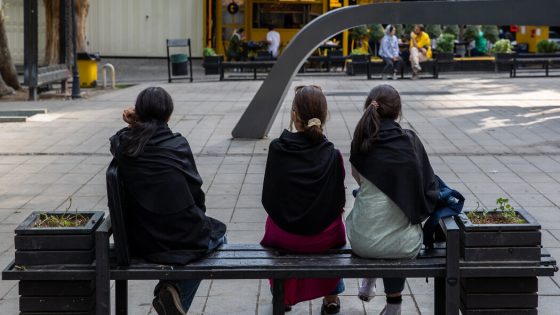Iranian officials insisted for decades that the law requiring women to cover their hair and dress modestly was sacrosanct and not even worth discussion. They dismissed the struggle by women who challenged the law as a symptom of Western meddling.
Now, as Iran holds a presidential election this week, the issue of mandatory hijab, as the hair covering is known, has become a hot campaign topic. And all six of the men running, five of them conservative, have sought to distance themselves from the methods of enforcing the law, which include violence, arrests and monetary fines.
“Elections aside, politics aside, under no circumstances should we treat Iranian women with such cruelty,” Mustafa Pourmohammadi, a conservative presidential candidate and cleric with senior roles in intelligence, said in a round-table discussion on state television last week. He has also said that government officials should be punished over the hijab law because it was their duty to educate women about why they should wear hijab, not violently enforce it.
The hijab has long been a symbol of religious identity but has also been a political tool in Iran. And women have resisted the law, in different ways, ever since it went into effect after the Islamic Revolution in 1979.
It is unlikely that the law will be annulled, and it remains unclear whether a new president can soften enforcement. Different administrations have adopted looser or stricter approaches to hijab. Ebrahim Raisi, the president whose death in a helicopter crash in May prompted emergency elections, had imposed some of the harshest crackdowns on women.
Still, some women’s rights activists and analysts in Iran say forcing the issue to the table during elections is in itself an accomplishment. It shows that the “Women, Life, Freedom” movement of civil disobedience, which began nearly two years ago, has become too big to ignore.
Women and girls are walking on the streets, eating in restaurants, going to work and riding public transportation wearing dresses, crop tops and skirts, and leaving their hair uncovered. In doing so, they take great risks, as the morality police lurk on street corners to arrest women defying the rules.
Fatemeh Hassani, 42, a sociologist in Tehran, said in a telephone interview that the fact that hijab and morality police had become an election issue showed that women, through their determination and resistance, had been “effective in influencing the country’s domestic policies and forcing the government to recognize their demands for more rights.”
Women represent about half of Iran’s 61 million eligible voters. Although voter apathy is high among critics of the government, opposition to the hijab law and the morality police is no longer confined to them. It has transcended gender, religious and class lines, and now some of the loudest complaints come from religious people and conservatives, the backbone of the government’s constituents.
During a live televised debate on Friday on social issues, women and the hijab dominated the four-hour event. The issue has also surfaced in campaign videos that appear to be targeting female voters and rallies in cities around the country.
In Isfahan, video from a rally for one candidate, Dr. Masoud Pezeshkian, showed an 18-year-old girl, her long black hair flowing around her shoulders, taking the microphone. She said she represented the young generation and first-time voters, the generation that stands up for its demands, and asked, “Do you have the power to confront the morality police, the hijab monitors and the autonomous security forces?”
Dr. Pezeshkian is the lone candidate for the reform faction, which favors more social openness and engagement with the West. He has been the most forceful voice against the mandatory hijab and the morality police, and the only candidate to clearly say he opposes telling anyone how to dress.
“We will not be able to force women to wear the hijab,” he said during the debate on Friday. “Will arrests, confrontations and shameful behavior resolve this issue?”
Not all female voters are convinced that a change is coming. Even with the condemnations by the candidates, the morality police still patrol the streets around Tehran and other big cities daily with vans and police cars. They sometimes stop women and give them a verbal notice, and sometimes they arrest them. Several videos on social media have shown women being beaten and dragged into vans.
“I don’t believe them. The president has no authority over this issue because it’s a red line for the Islamic Republic,” Sephideh, a 32-year-old teacher from Tehran, said in a telephone interview, asking that her last name not be published to avoid possible retribution. “But in previous elections, the issue of hijab was abandoned, and now they are all talking about it,” she added, concluding that women’s struggle “will win.”
Iranian women who do not believe in wearing hijab have been fighting the law for as long as it has existed since after the 1979 Islamic revolution. Back then, clerics who toppled the monarchy imposed Islamic sharia laws on all aspects of social life, from women’s attire to mingling of genders and drinking alcohol.
The Women, Life, Freedom movement began in 2022 after the death of Mahsa Amini, 22, in the custody of the morality police, who had arrested her on accusations of violating the hijab law. Outraged women and girls led nationwide protests burning their headscarves, dancing in the streets and chanting for women to be free. The uprising spread in scope, with demands for an end to clerical rule. The government ultimately crushed the protests with violence.
In December, Iran announced it had abolished the morality police but then put them back on the streets in April, after Ayatollah Ali Khamenei, Iran’s supreme leader, said that observing the hijab law was a moral and political obligation.
Iran’s Parliament has been working on legislation that would impose punitive damages on women who disobey the rules, including denying them social services, imposing travel bans and permitting the judiciary to withdraw funds from their bank accounts.
Mr. Pourmohammadi, the cleric candidate, said during one debate that if elected, he would repeal the legislation. Gen. Mohammad Baqer Ghalibaf, the front-runner conservative candidate and current speaker of the Parliament, said in the debate that the legislation still needed work and that “you cannot achieve anything with violence, tension and without respect — all of this is condemned.”
In recent months, facial recognition software, both in traffic surveillance cameras and drones, has been used to identify hijab scofflaws, who then are texted a summons to appear in court, according to three women interviewed who had received such messages and a report by Amnesty International.
Nahid, 62, a resident of Tehran who did not want her last name published for fear of retribution, said that when she was summoned the judge showed her a photograph of her near a mall, her blond hair uncovered, and that she was fined.
Another woman, Minoo, 52, who wears hijab, said in an interview that her car had been confiscated for two weeks because traffic cameras caught her 20-year-old daughter driving while not wearing one. She said the police had also made her pay the parking fee for the impounded car.
Enforcement of the law has brought widespread condemnation abroad from right groups and Western countries.
A teenager on her way to school in October collapsed in the subway, after reports of an argument with a hijab police officer, and died in the hospital.
Fahimeh, a 41-year-old fashion blogger, said in an interview in Tehran that whoever becomes the next president would have no bearing on the fight for more rights. “We women don’t wait for their permission to remove our hijab; right now already, many don’t wear hijab.”
Narges Mohammadi, the Nobel laureate who is the most prominent women’s rights activist in Iran and currently serving a 10-year prison sentence, issued a statement on Saturday describing the election as a sham.
“How can you, while holding a sword, gallows, weapons and prisons against the people with one hand, place a ballot box in front of the same people with the other hand, and deceitfully and falsely call them to the polls?” Ms. Mohammadi said.
Source Agencies



